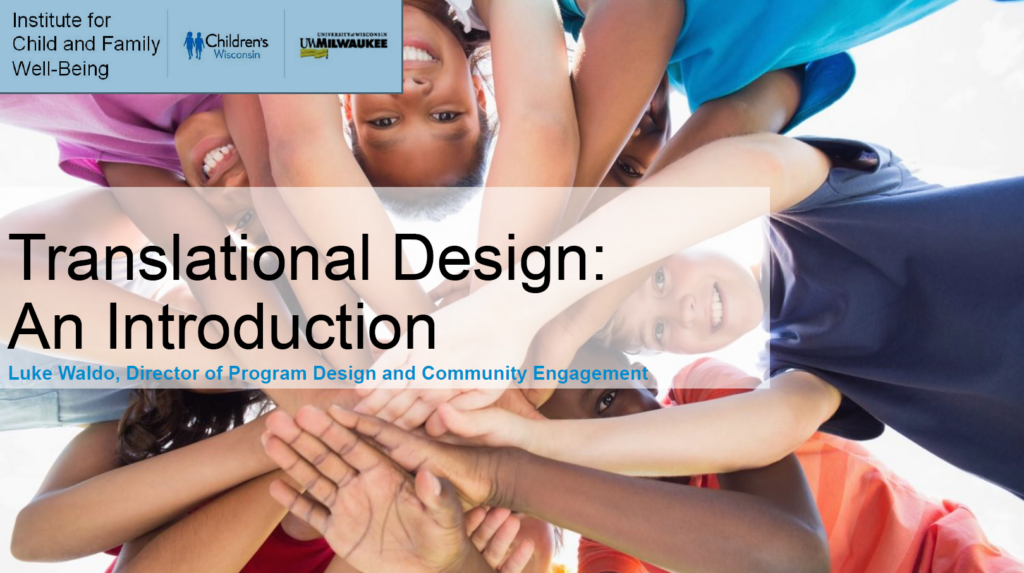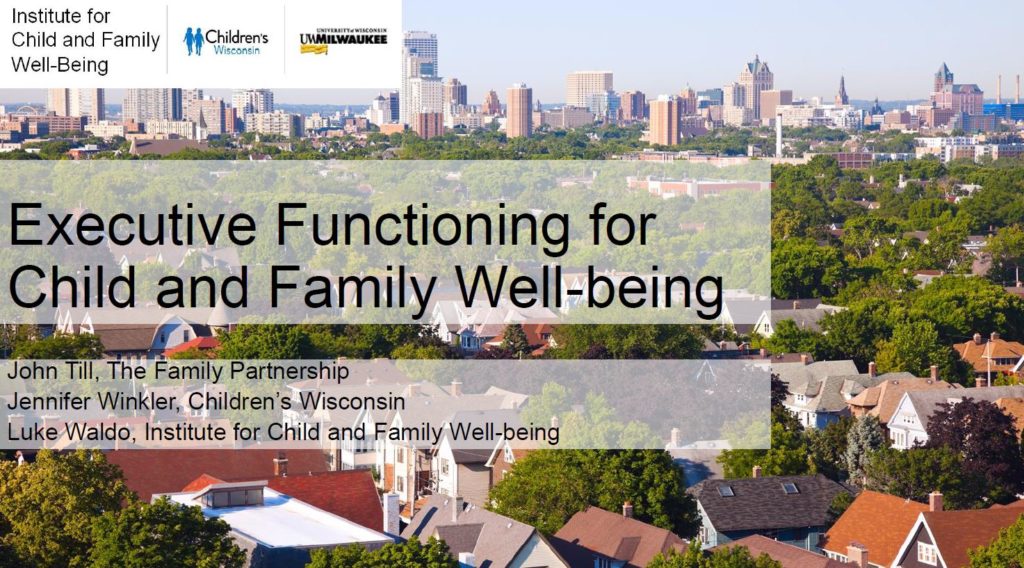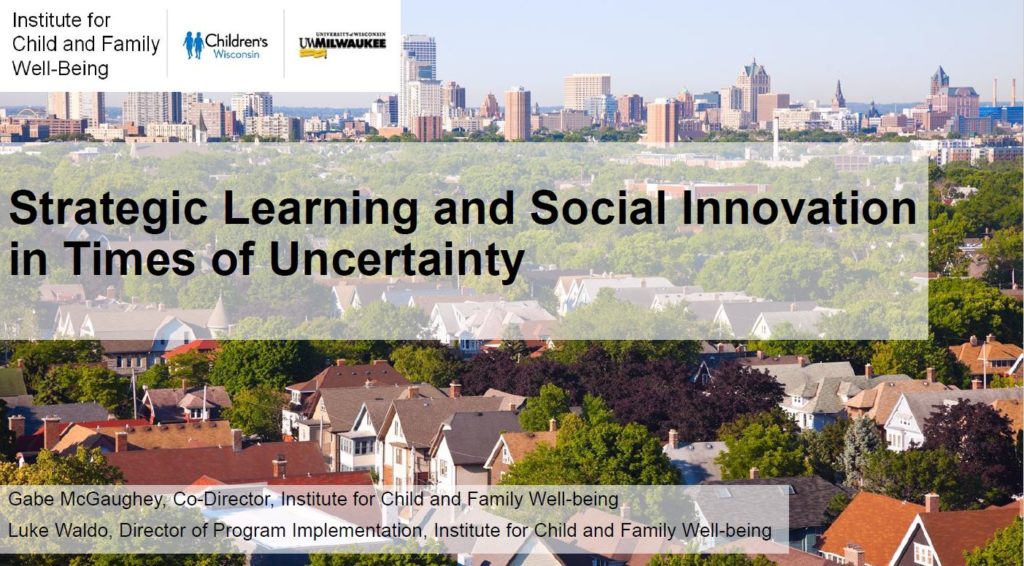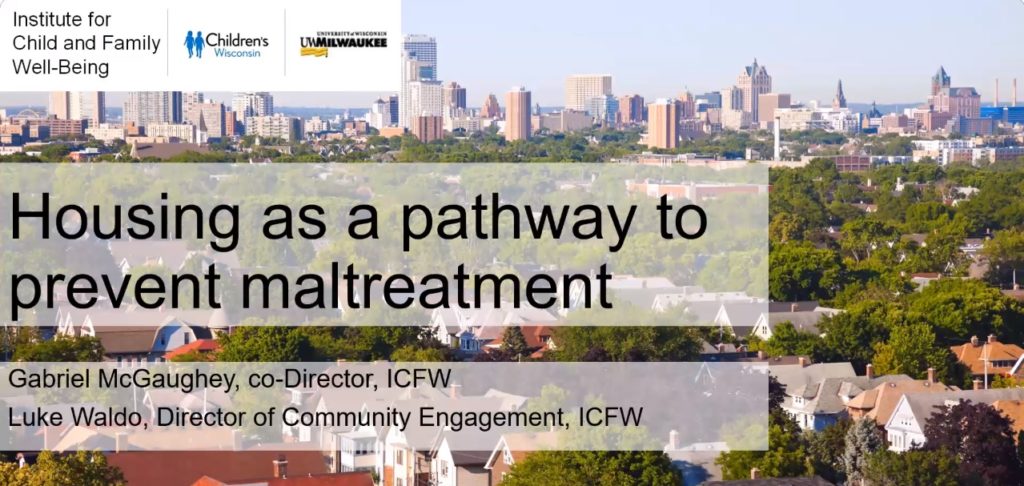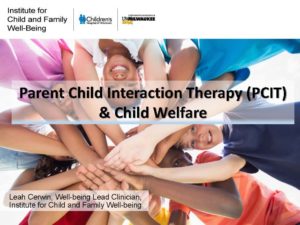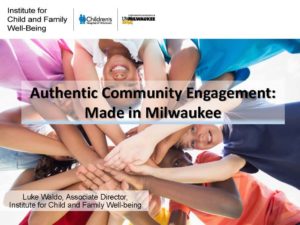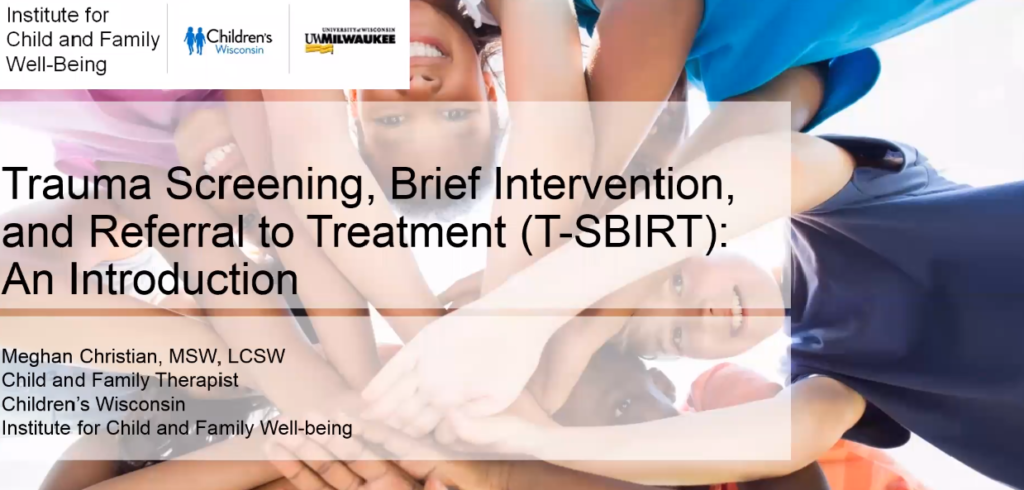 The Institute for Child and Family Well-Being was proud to host the webinar “Trauma screening, brief intervention and referral to treatment (T-SBIRT): Introduction to a promising, brief protocol for social service and healthcare settings.” Led by Dr. Dimitri Topitzes, Clinical Director of the Institute for Child and Family Well-Being, and Lisa Ortiz, UMOS, the webinar took place on June 17th at 11:00 CST.
The Institute for Child and Family Well-Being was proud to host the webinar “Trauma screening, brief intervention and referral to treatment (T-SBIRT): Introduction to a promising, brief protocol for social service and healthcare settings.” Led by Dr. Dimitri Topitzes, Clinical Director of the Institute for Child and Family Well-Being, and Lisa Ortiz, UMOS, the webinar took place on June 17th at 11:00 CST.
This webinar introduced participants to a discrete trauma responsive protocol – trauma screening, brief intervention and referral to treatment or T-SBIRT – which has been implemented in various healthcare and social services settings in southeastern Wisconsin. Integrating T-SBIRT within such programs recognizes two interrelated truths: 1) most people experience significant adversity and trauma across the life course, an assertion that is all-the-more salient during this time of pandemic, stay-at-home orders, and collective trauma, and 2) frequent exposure to adversity and trauma undermines functioning across myriad domains including physical, mental, and behavioral health.
Delivered by psychotherapists, case managers, nurses, or other professional service providers, T-SBIRT helps programs address the effects of trauma exposure among clients or patients. More often than not, trauma is at the root of client and patient presenting problems. The protocol therefore contributes to effective and efficient trauma-responsive care and overall service delivery.
During the webinar, we described the T-SBIRT protocol, which is based on SBIRT for substance misuse and requires anywhere from 10 to 30 minutes to complete. In addition, we reviewed results from several studies that we recently published, indicating that it is feasible to implement T-SBIRT within healthcare and social service programs and that T-SBIRT may be associated with improved mental health and employment outcomes.
Dr. Topitzes, designed and tests T-SBIRT, and Lisa Ortiz is a supervisor who oversees implementation of T-SBIRT in her TANF program. While Dr. Topitzes provided details about the protocol and feasibility studies, Ms. Ortiz discussed her experience with T-SBIRT, highlighting obstacles to implementation along with perceived staff and client benefits.
Listen to the recorded webinar here.
Related Resources from the ICFW:
T-SBIRT Protocol (English version)
T-SBIRT Protocol (Spanish version)
ICFW Screening and Assessments: Childhood Experiences Survey, Adult Experiences Survey, Lifetime Experiences Survey
Fact Sheet: Understanding and Responding to Trauma
Issue Brief: Trauma Screening, Brief Intervention, Referral to Treatment (T-SBIRT)
Issue Brief: Asking Sensitive Questions
T-SBIRT Demonstration Video
Referenced websites for more information:
National Center for PTSD
 This webinar will make the case that all new parents deserve to be offered a home visit by a highly qualified healthcare professional. Research has shown that postnatal visits can have significant prevention benefits, including a reduced risk of child abuse and neglect. A new initiative in Racine and Walworth counties will be described that aims to ensure that all parents with newborns are eligible for a home visit by a public health nurse. Grounded in the principle of progressive universalism, which balances equal access to care with an equitable distribution of resources, this program will be tailored to ensure that each family receives direct care and connections to community services that match their needs.
This webinar will make the case that all new parents deserve to be offered a home visit by a highly qualified healthcare professional. Research has shown that postnatal visits can have significant prevention benefits, including a reduced risk of child abuse and neglect. A new initiative in Racine and Walworth counties will be described that aims to ensure that all parents with newborns are eligible for a home visit by a public health nurse. Grounded in the principle of progressive universalism, which balances equal access to care with an equitable distribution of resources, this program will be tailored to ensure that each family receives direct care and connections to community services that match their needs.

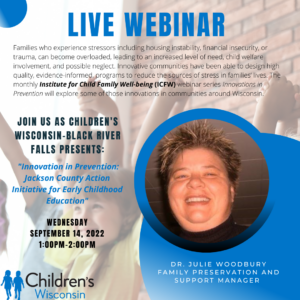 Accessible, affordable and high-quality early childhood education (ECE) can contribute to cognitive, emotional and social development in children helping them grow into thriving, contributing adults. For parents and caregivers, ECE provides them with the opportunity for gainful employment, economic stability and self-sufficiency. The Jackson County Childcare Network (JCCN) identified Jackson County as an early childhood education desert, with capacity to only serve 278 children of the estimated 1000+ children in need of care. This disparity has resulted in an estimated $2.5 million loss in work productivity, parents unable to work to their full capacity, while 17.8% of children in the county live in poverty. The stressful conditions and circumstances associated with the lack of ECE options, un/under-employment, the effects of poverty, and toxic stress all are risk factors for poor child health outcomes, including increased risk for experiencing neglect.
Accessible, affordable and high-quality early childhood education (ECE) can contribute to cognitive, emotional and social development in children helping them grow into thriving, contributing adults. For parents and caregivers, ECE provides them with the opportunity for gainful employment, economic stability and self-sufficiency. The Jackson County Childcare Network (JCCN) identified Jackson County as an early childhood education desert, with capacity to only serve 278 children of the estimated 1000+ children in need of care. This disparity has resulted in an estimated $2.5 million loss in work productivity, parents unable to work to their full capacity, while 17.8% of children in the county live in poverty. The stressful conditions and circumstances associated with the lack of ECE options, un/under-employment, the effects of poverty, and toxic stress all are risk factors for poor child health outcomes, including increased risk for experiencing neglect.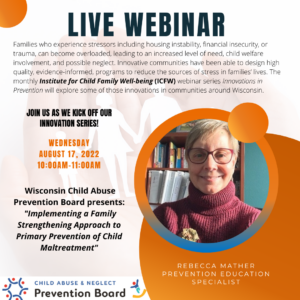 Innovation, the process of trying new ideas to solve new or under addressed challenges has long been central to child maltreatment prevention. The ICFW Innovations in Prevention webinar series focuses on elevating innovations in Wisconsin, serve as a platform to share new ideas, and make connections across communities. This webinar focuses on the primary prevention of child maltreatment tactic referred to as the Family Strengthening approach. Rebecca Mather from Wisconsin’s Child Abuse Prevention Board provides a presentation focuses on:
Innovation, the process of trying new ideas to solve new or under addressed challenges has long been central to child maltreatment prevention. The ICFW Innovations in Prevention webinar series focuses on elevating innovations in Wisconsin, serve as a platform to share new ideas, and make connections across communities. This webinar focuses on the primary prevention of child maltreatment tactic referred to as the Family Strengthening approach. Rebecca Mather from Wisconsin’s Child Abuse Prevention Board provides a presentation focuses on: